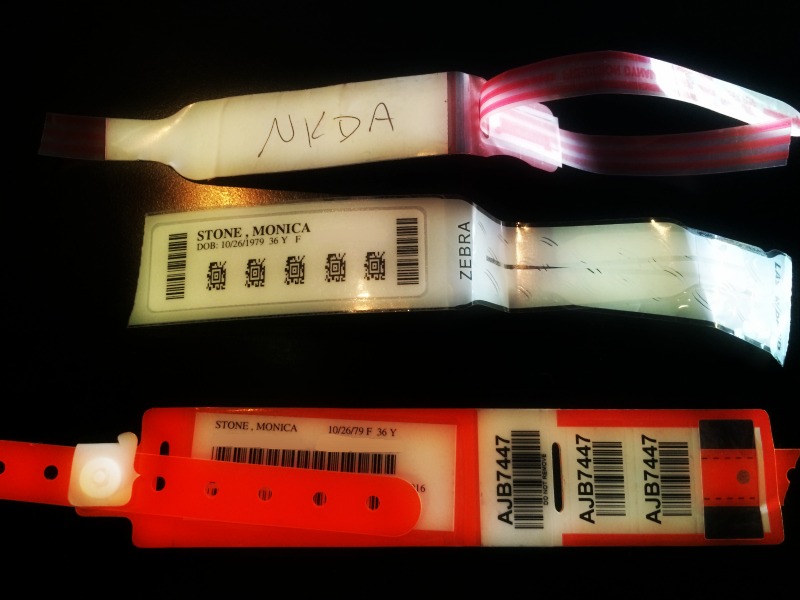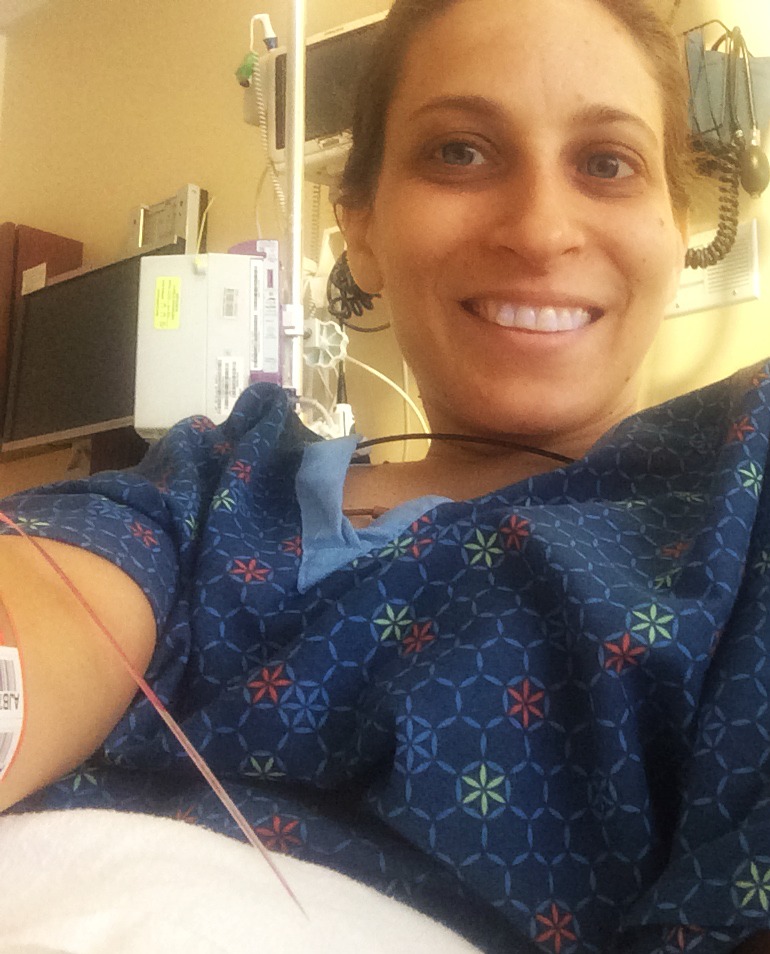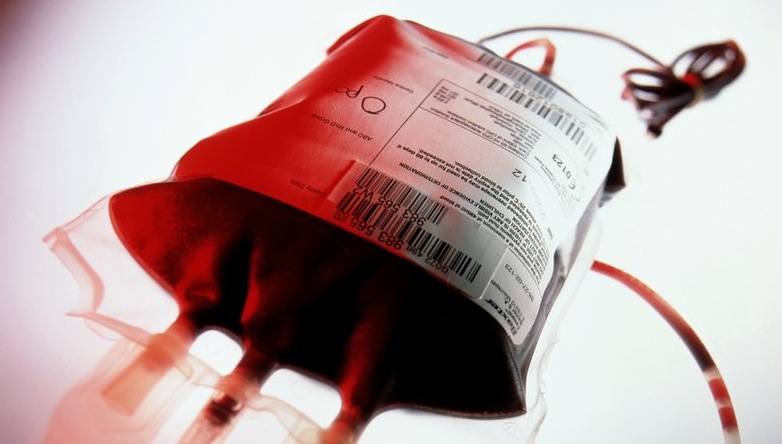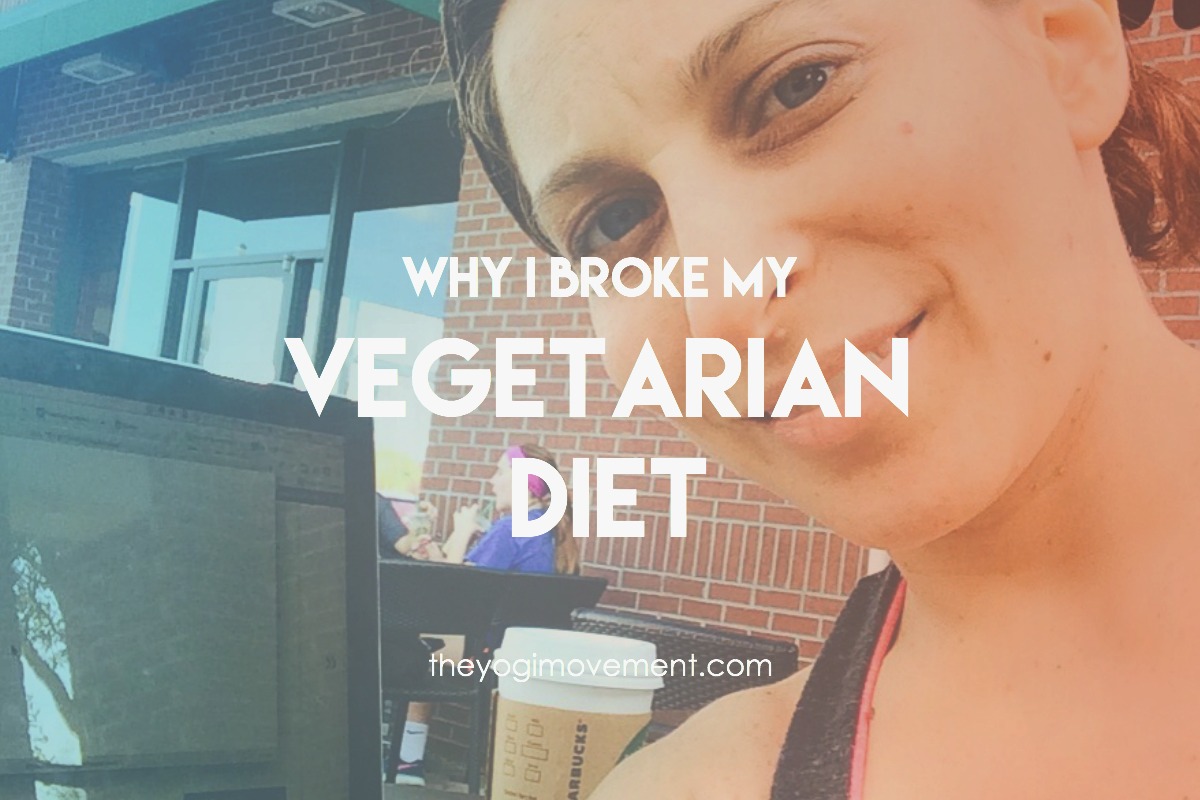It had been a few years since I had really gone to the doctor, had a physical, and routine blood work, but it was time. I went into the lab to do my blood test, and the very next morning I get a call from my doctor telling me I need to go to the hospital.
I’ve always been a healthy person, so you can imagine this shook me up a bit.
My hemoglobin levels were low. Like extremely low.
He asked me if I was experiencing shortness of breath, dizziness, or if I was weak, and I said “no!”
I was experiencing low energy, but nothing out of the ordinary.
Then he said, “You need to go to the hospital and get a transfusion.”
Those were some of the scariest words I ever heard.
I said, “A transfusion!” In a really shaky panicky about-to-cry voice.
He said, “Just come down here and I’ll give you the report. Bring it to the hospital with you, and see what they suggest next. But, don’t worry.”
So, that’s what I did.
I grabbed my report, and went to the hospital.
The nurses looked at me, and said, “Wow that’s low, but you don’t resemble any of the symptoms of hemoglobin this low.”
If you’re wondering what this all means, let me explain:
Hemoglobin is a protein in your red blood cells that carries oxygen to your body’s organs and tissues and transports carbon dioxide from your organs and tissues back to your lungs. (Source)
A normal hemoglobin level is 11-13
An anemic level is 8-9
I was at 5.9
They took me into the ER, and hooked me up to a bunch of machines, stuck me with an IV, and redid my blood work. The nurses & doctors stayed there with me, and answered all of my questions while we waited for the results.
I had A LOT of questions while I waited, so here are some of the facts….
- A low hemoglobin level means you are anemic. I wish my doctor would have told me that when he rushed me into the hospital. I felt a little better knowing I was anemic and that it wasn’t because of a cancer that I was slowly dying of!
- When your hemoglobin levels are under 7, that means your heart has to work harder, so your heart rate will be faster.
- When your hemoglobin levels are as low as mine, then you’re at a high risk for a heart attack or stroke because less oxygen is getting to your brain.
- When your levels are under 7, then they are likely to give you a blood transfusion.
- There are only two ways that your levels can drop and become anemic: 1) You’re losing blood either internally or externally, or 2) you’re body is not able to produce the hemoglobin.
- When you’re losing a ton of blood, you’re going to lose nutrients with it – especially iron.
- You can also become anemic from a b12 deficiency, but a dietitian came to talk to me in the hospital, and she told me that a deficiency takes years to show up.
The Results:
My hemoglobin came back at 6.3, which is still very low. The ER doctor told me that they usually do a blood transfusion when the levels are under 7, and if he sent me home I was at risk for a heart attack or stroke.
This freaked me the F*** out! I definitely WAS NOT ready to die, and a blood transfusion just seemed really scary.
I called my parents and they immediately drove up from Sarasota. I don’t know what I would have done without them.
They admitted me to the hospital, and gave me a room.

At that point I was still a little lost.
Was I staying the night?
Am I getting a transfusion?
Is that all they could do?
How high are the risks?
I quickly asked the nurse if I was going to be able to go home that day, and she told me that they weren’t going to be able to figure everything out in just one day.
The doctor still had to talk to me, and then we need to figure out the next step. She said that he’ll probably suggest a transfusion along with iron pills, and maybe run some other tests.
I woke up preparing to get some work done, and instead ended up with my hair in a messy bun wearing an awkward hospital gown!
Below is an unexpected decent picture in a hospital bed.

Once the doctor talked to me, it was clear I needed a blood transfusion.
He said that even if they just gave me an iron infusion and B12 shots, which I still needed, that alone wouldn’t bring up my hemoglobin levels. He said that’s not a fast process, and I would still be at risk for a heart attack or stroke.
They assured me that the blood transfusions are heavily screened, and they were safe.
The Transfusion:
I had no idea how a blood transfusion worked, and most of my friends didn’t understand either, so I wanted to explain the details here.
Of course even though they are heavily screened, there are still risks. It’s possible to have a negative reaction to the blood, so I was happy my parents were there while I had the transfusion.
I was given one unit of blood.
The blood is given through a drip. The IV was in my arm from the time they took my blood in the ER.
I had to sign a release, and then they have to wait for the blood to thaw out. It took about 2 hours from when I signed the release for the blood to be ready.
Once they brought it up, the nurses both double checked everything. They checked to make sure that it was the correct blood type, and that it was prepared for specifically for me.
They flushed my IV with saline first, which was a little cold. It wasn’t irritating or painful. I just felt a rush of cold on the bottom of my arm through my fingertips.
I know that sounds chilling, but it wasn’t bad.
Then, they hooked up the bag to the machine, and it was just a slow drip into the IV, then into my arm.

They checked my vitals every 15 minutes for the first hour just to make sure I wasn’t having a reaction to the blood.
The whole thing took about 4 hours, and was a pretty easy process.
The machine would pump blood through the tube every few minutes, and that was the only time I felt a little discomfort. Every 10 minutes, I’d feel the blood being pushed through the IV, and it stung a little. (That’s the chilling part).
I asked the nurse if that was normal, and she said that it was. She checked my skin around the IV, and she said as long as the skin wasn’t becoming red, hard, or inflamed then it was ok. My skin was soft and normal, so I was just waiting for it to end.
I asked the nurse what they expected my hemoglobin count to rise to, and she said they were hoping at least to 7 or 8.
They were also giving me B12 shots, iron pills, and folic acid.
The Next Morning:
The transfusion was over around midnight, and they woke me up around 5:45 am to take my blood again.
It took a few hours to come back, but my hemoglobin was up to 8.3!
It was such a relief that it was above 7.
I wasn’t done yet though. The doctor also ordered an iron infusion, which was a drip just like the blood transfusion, but only took an hour and a half.
The iron infusion was my least favorite part. By that time, my IV had been in me for awhile, and was just starting to feel irritated. I could feel the iron pump through just like the blood, but more intense. I hated it!
The area around my IV was starting to turn red and hard, and I was just ready for this all to be over.
I did have a small reaction to the infusion right at the end. My chest and back started to feel heavy, and it hurt to take deep breaths. I got out of the hospital bed to stretch, and I started to feel a burning sensation on my legs. When I looked down, I had little red bumps on my lower leg.
The nurse had me get up and walk around, and it slowly started to go away. She told me these are minor side effects.
Towards the end of my walk, I realized my left hand was in pain and becoming swollen, and I couldn’t bend my fingers. She took out my IV, and it took about an hour, but the swelling went down, and I could finally move my hand again.
I don’t know if the swollen hand was from the irritated IV or the iron.
My two least favorite things about the hospital: The awkward hospital gowns with ties and snaps that make no sense, and the damn IV.
Why Were My Levels So Low?
Warning: This part contains information about girl feminine stuff, and it that freaks you out, you can skip it. Or, you can get out of your comfort zone and read it anyway. Try to think of this as medical. Just knowing this information could help someone some day!
So, you might be asking, why were your levels so low? Are you not able to make blood, or were you losing it?
I was losing it – and A LOT of it!
I have this thing called a fibroid tumor. It’s located in my uterus, and has been disruptive to my life for the last 8 or so years. They’re never cancerous, and tons of people have them. In fact, most people have no symptoms.
I definitely have symptoms!
I’m sharing this because I had a ton of really bad doctors before I finally found one that diagnosed it. Then, it wasn’t until I was admitted to the hospital that I found a doctor that actually warned me of the severity of it.
If you feel like you’re losing an abnormal amount of blood from your menstrual cycle, then it’s very likely that you have a fibroid, and that you are anemic.
While I was in the hospital, they ordered an ultrasound, and my fibroid was at 6 cm.
I also had a consult from a doctor that explained how fibroids work.
She told me that when fibroids are under 4 cm, that you can work with them. You can try birth control pills or natural things to try to lighten it, but when it’s over 4cm there’s very little chance of success to work with it.
Basically, the only way to change the quality of my life and change my health is to remove it.
The Beginnings:
When I first thought this was abnormal about 8 years ago, I went to about 3 different doctors to explain what was happening. All of them told me that was normal and happens when you enter your late 20s or early 30s. Then, they just all tried to get me on the latest birth control pill. The pill never helped, so I went off of them, but just found ways to manage it.
I still knew something was wrong, so I tried again about 4 years ago with a new doctor, and just from feeling my abdomen, she could tell something was wrong. She ordered an ultrasound, and the fibroid was diagnosed. It was about 6 cementers.
They told me it was pretty big, and talked to me about my options, which were to either try pills again or get it removed. The sonographer explained to me that some people get them removed, and some people keep them. She explained that sometimes they shrink with age, too.
After that, I went to a specialist, and he told me to not get it removed because I’m still at child bearing years. He said that if I get it removed it could disrupt fertility.
I had another doctor tell me that keeping it in could cause miscarriages, but then described a bunch of surgeries that seemed really scary.
No one was really clear, and I didn’t know that 4cm was the magic number, so that’s why I decided to go to the Ayurvedic doctor. I tried changing my diet, using castor oil & heating pads, a ton of different herbs that I had to order online. I did that for about 6 months, but nothing changed.
When I asked the doctor in the hospital about fertility, she said that it helps fertility to get it removed because the fibroid could cause miscarriages, and the surgery that she would be doing actually preserves fertility.
I cried when she told me that.
I haven’t had my surgery yet, but I will in the next month!
Breaking Vegetarian:
So here’s the deal. I was losing so much blood, and through that blood loss I was losing nutrients like iron and B12.
As a strict vegetarian, it’s difficult to get B12 unless you’re using a supplement or eating fermented foods. And, even though it’s not difficult to get iron, you have to be aware of what you’re eating to make sure you’re on top of all of the daily intake of all vitamins and minerals.
For the last few months, I’ve been craving fish, and I am pretty sure it’s because my body was lacking essential nutrients, and I wasn’t listening.
The plant based forms are fine for most people, but it’s not easily absorbed.
I’m prepared for the people who will fight me on this, but I don’t feel like it was safe for me to try to experiment with the plant based forms of iron and B12 while I have this issue going on.
While I’m dealing with this condition, and losing all of this blood, I need to make sure I’m loading my body with B12 and Iron, which will at least help bring up my hemoglobin. So, if I do lose more blood before my surgery, hopefully it won’t go as low as it was before.
I decided to start eating fish, which I feel has been giving me energy. My body is thanking me.
Moving Forward:
So, what’s the next step for me?
Well along with eating fish…
I am giving myself weekly B12 shots. I was terrified to stick a needle in my skin, but it’s getting easier!
I’m on iron pills.
Now, I’m just waiting for the surgery.
I can’t even explain how much better I feel now that I’ve made these changes. I used to have these rings around my eyes that are virtually gone, my skin has more color, and I smile a lot more.
I had no idea how much this was holding me back!
I have so much more to tell you, but that’s for another post!
So, I want to ask you. Have you ever had a fibroid, or are you anemic? How do you deal with it? What are some of your favorite iron rich recipes. Please share with me!

Very proud of you for sharing this story. I know it will be helpful to many of your readers!!
THanks mom!
Whoa, this was really scary, but very informative. Thanks for sharing, and I’m glad you’re doing better 🙂
I know Lindsay Cotter (Cotter Crunch) has an iron-rich meal plan on her site (just search “iron”). I think it probably contains meat other than fish, but I’m sure you can find some ideas there!
I love lindsey cotter!
Wow, this was so informative. Thank you so much for reading. I had no idea about any of these, from fibroid to hemoglobin. Learned so much. Who know maybe I’ll need this in the future.
Thank you for reading Shinee!
Wow. That is a lot to go through. I am glad you found what was causing your anemia and are taking care of it. There are so many different opinions when it comes to your health and as a nurse I always recommend getting 2nd, 3rd, even fourth opinions if necessary.
Thank you! I did get a few opinions & feel great about my doctors now!
Wow, that is scary but so glad you caught it!!
I have had polyps removed (2 – at the same time) that they weren’t sure until they got in there if they were fibroids or polyps. If I remember correctly, the polyps were much easier to deal with overall, so it was good. I wasn’t losing as much blood as you, however – my symptoms were more that I was bleeding (lightly) all the time, not just during cycles.
As for iron, I’ve recently discovered that 1/4 cup of pepitas has a healthy dose of iron (the ones I buy say 35% DV, but I’ve seen many variations trying to verify that), as well as a 10-13g of protein. I am not a nutritionist, but I am curious about a chart I saw that showed the roasted pepitas having more iron than raw… I need to do more investigating!
Thank you so much for your help! I haven’t tried pepitas, but I will now!
Hello and thanks for sharing your story. I’ve had low level anaemia on and off ever since I can remember. I’m not too sure why since I’m not really a vegetarian (although nowadays I rarely eat meat, this is true, but the anaemia was first picked up 23 years ago), I have no heavy periods (in fact I only menstruate every 16 weeks now that I’m 43). Anaemia is awkward though even if it doesnt cause you any symptoms (probably I got used to mine, you clearly were suffering) since it freaks out the doctors each time you have your blood work done. The most troublesome reading for me was hb 9 in first trimester when pregnant with my first child (I have 4 now) and although I was very healthy this was put forward as a reason to not have a home birth (which I had in the end, for each of my sons). I’m not one for popping pills, I’ve never taken birth control except in my early 20s, and when I tried iron pills they got me very constipated. I have problems with my digestive system in general and last thing I need is something that’s going to make it slow down. I was also told that in a pill form the iron isnt as absorbable by the body as when it comes as a natural nutrient in “normal” food. I’m not saying you should change anything to your routine now as it’s important you get your issue sorted and you seem to be in good hands and at peace with the next step and this is really important. Long term if you need to continue to take iron, I just wanted to suggest a supplement I take from time to time. You seem to be US based so not sure if you’ll get it easily where you are. It’s called Floradix. I’ll let you google as I’ve never been on this post and therefore dont know how acceptable it is here to put forward products by name and in effect advertise them. It’s simply a plant extract which you drink a capsule off every morning. It worked very well for me when I was pregnant and hb went from 9 to 12 at which point the midwives were happier and so was I. The best iron you can get will always come from your food though. Simple, fresh, homemade food with lots of green stuff and nuts. Wishing you all the best for the future.
Thank you so much Emma! This was super helpful. I am still on the iron pills & am going to switch to the liquid soon! My doctor told me not to switch, and to just stay for awhile on what the hospital prescribed, but I know the liquid would be better. I have heard from many people! I am getting things under control finally, so I think it’s time for a change! Anemia is pretty weird how it effects people! I am glad you are doing great & had no problem with your kiddos & were able to have a home birth! xoxo
I was first diagnosed with anemia 3 years ago after bleeding for 6 weeks straight with my period. My hemoglobin was 9 and my iron stores were depleted. I started taking ferrous sulfate twice a day and started feeling better in 2 weeks. I’m a runner and have always been slow, but once I started taking the iron I started getting faster and faster and realized I had probably been anemic to some degree for a long time due to heavy and frequent periods that worsened as I entered peri menopause. good luck!
Thank you Sara for your insight! My iron pills really help & I also started eating fish which is helping too!